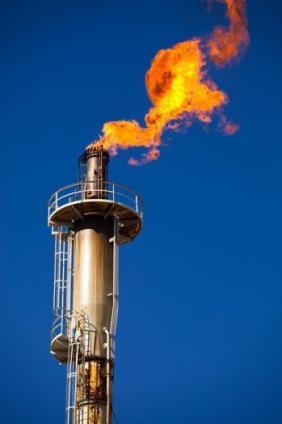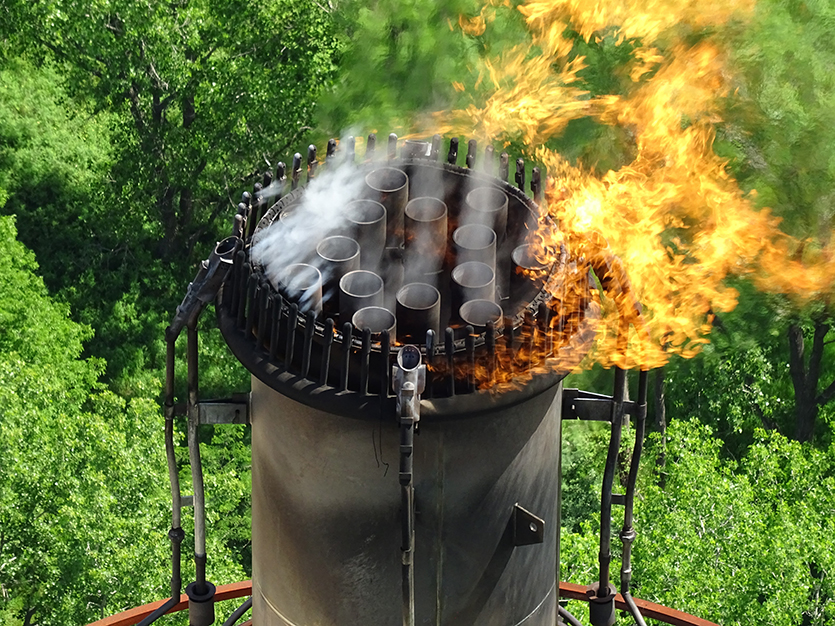Complete Waste Gas Combustion Requires Accurate Combustion Gas Flow Measurement

Metal tube variable area flowmeters are robust, reliable and proven to deliver repeatable gas and liquid flow measurement in challenging environments. That’s why they are commonly used in the petroleum industry to measure and control combustion gas flow in flare stacks. Here is a little background on the application.
Much attention is given to the gases being flared, or combusted, in a typical flare stack. There are environmental emission regulations to be met. The flare gas stream may have some aggressive components, such as H2S, that may need to be neutralized. But how to control the combustion gas?
Accurate Combustion Gas Flow Measurement is Essential for Complete Waste Gas Combustion
A typical flare stack has a main tower to handle the gases being exhausted from the facility’s process. Running up the center of the stack is a separate gas line feeding combustion gas to the top of the flare stack. The top of this gas line has a nozzle, or flare tip, that controls the flame used to flare the waste gas exiting the flare stack. Complete combustion of the waste gas is critical for both safety and environmental concerns. Accurate flow measurement is essential for complete waste gas combustion.
 Photo courtesy of Aetos, a member of Mistras.
Photo courtesy of Aetos, a member of Mistras.
Considerations When Specifying a Flowmeter for Flare Stacks
The Brooks Instrument MT3809G metal tube variable area flowmeter is ideally suited to measure the combustion gas.
Local indication of the flowrate is provided, with no electrical power required! Due to the inherent reliability and repeatability of a variable area flowmeter (rotameter), the MT3809G provides accurate, cost effective flow measurement of the combustion gas. The water-tight, rugged MT3809G construction is ideal for outdoor flare gas applications.
An optional control valve can also provide local control of the combustion gas. Since this combustion gas is usually supplied from a regulated facility gas header at a constant pressure, we typically will recommend that the valve be installed on the outlet side (top) of the MT3809G to ensure a consistent operating pressure for the flowmeter. This is especially important if there are other process equipment downstream from the flowmeter, such as a pressure regulator controlling the pressure to the flare tip.
Typically, the combustion gas is a gas mixture, sourced locally at the facility where the flare is located. At a petroleum refinery, there is a specific gas mixture, referred to as fuel gas, that is a byproduct of the refining process. This fuel gas is used for various purposes at the refinery, including as flare combustion gas. At an oil or natural gas wellhead, the natural gas produced locally at the well can be used as combustion gas if a flare stack is installed locally at the wellhead. To ensure proper calibration of the MT3809G, the gas properties of the combustion gas must be provided. The molecular weight (MW) and viscosity of the mixture will usually be sufficient.
The MT3809G can also be provided with additional electrical options.
An alarm feature can be used to set alarm limits for maximum and minimum flowrates for the combustion gas, adding additional reliability to the system. A 4-20 mA loop powered electrical transmitter will provide real time analog output of the flowrate for environmental monitoring purposes. If a digital output is required to the facility DCS, the standard analog transmitter is HART compatible. An optional FOUNDATION™ Fieldbus interface is also available.
There are many factors to consider when specifying a measurement instrument. Take advantage of the knowledge and expertise of the Applications Engineering team here at Brooks Instrument. Our experience in tens of thousands of installations globally will provide you with the optimum solutions for your critical flow measurement and control applications.
Component datasource missing. Select a datasource for this component.